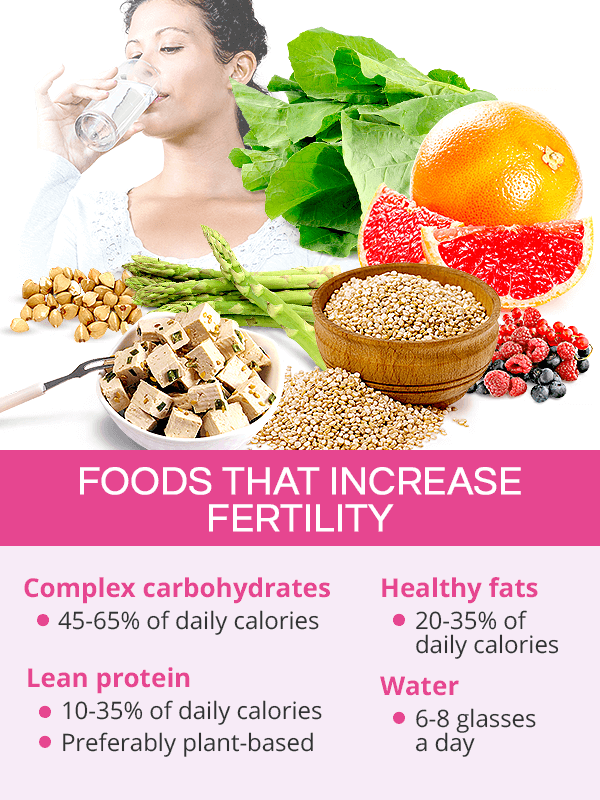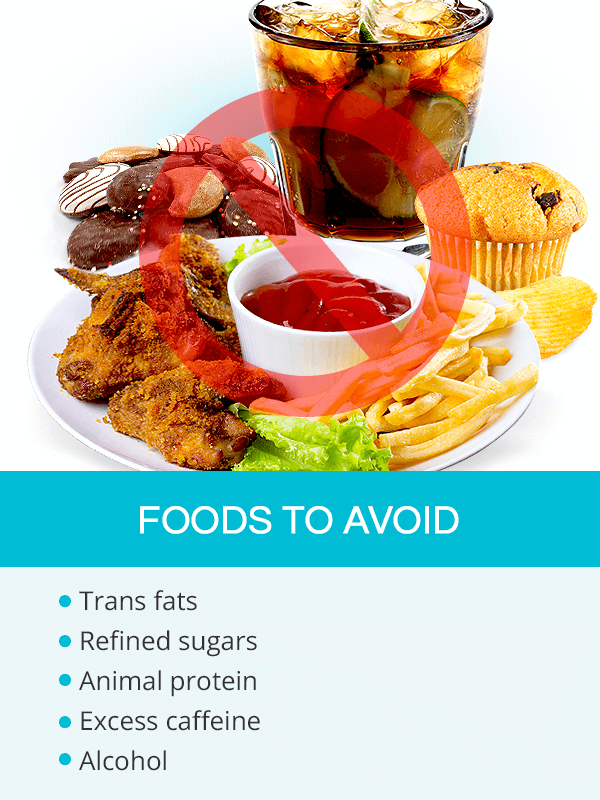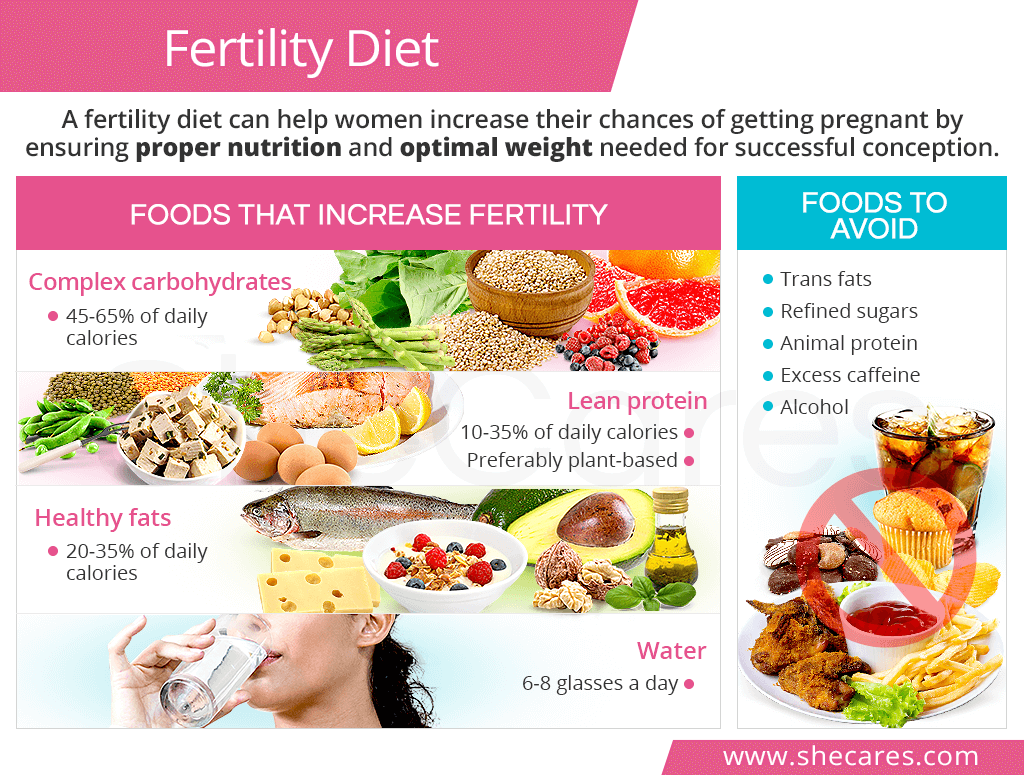Benefits of a Fertility Diet
Studies have shown that couples who build their diets around fertility boosting foods - along with other wholesome lifestyle practices and nutritional supplements - had much lower risks of ovulatory disturbances and higher chances of successful conception, both natural as well as one through in vitro fertilization (IVF).
There are three main benefits of following a fertility diet:
Ensuring Proper Nutrition
A poor diet can deregulate hormones, disrupt menstruation, and lower fertility because the human reproductive system runs on hormones, and their production cannot occur properly without good nutrition. A wholesome fertility diet rich in essential vitamins and minerals, especially zinc or folate, can ensure that a woman is getting the majority of the nutrients she needs for optimal hormonal levels and healthy ovulatory cycles.
Reaching Optimal Weight
Obesity is one of the main risk factors for infertility as excessive weight disrupts the production of estrogen and other reproductive hormones. Following a healthy diet to get pregnant can aid women in reaching an ideal body mass index (BMI 18.5 - 24.9) to regulate their menstrual cycles and increase their chances of conceiving. It has been found that even a 5% weight loss is often enough to restore a woman's fertility.
Developing Good Pregnancy Habits
Women implementing a varied preconception diet give themselves and their babies a head start as the habits they develop before conceiving will directly affect the progression of their pregnancies as well as the health of their babies. The best approach is to follow a meal plan as if already being pregnant.
Foods that Increase Fertility

A balanced preconception diet should contain three macronutrients - protein, carbohydrates, and fats - that are rich in key pre-pregnancy vitamins and minerals, or micronutrients. Almost all foods contain those three macronutrients, but in different proportions. A good fertility diet is all about knowing how to balance them to optimize conception efforts.
Complex Carbohydrates
Complex carbs are rich in fiber and are digested more slowly by the body. As such, they do not cause sudden spikes of sugar in the blood and keep its levels stable for longer. This prevents hormonal disruptions and ensures smooth ovulatory cycles.
Whole grains: buckwheat, quinoa, barley, millet, bulgur, oatmeal
Fruits and vegetables: berries, grapefruit, kale, spinach, asparagus, watermelon
Low glycemic sweeteners: maple syrup, stevia, agave
About 45-65% of a woman's calories should come from complex carbohydrates.
Lean Protein
Women preparing for pregnancy are encourage to opt for more plant-based protein as those who eat a high amount of meat have up to 40% higher rates of infertility. Fish sources of protein are great options, too, as they contain high levels of omega-3 fatty acids and other nutrients found to decrease the risk of pregnancy complications.
Plant protein: beans; lentils; nuts; seeds; moderate amounts of soy and soy products, like tofu or edamame
Low-mercury fish: catfish, cod, salmon, sardine, herring, tilapia, flounder
Other lean animal protein: eggs, chicken, turkey, beef trimmed of fat
Women with certain conditions, such as PCOS, are sometimes instructed to avoid dairy. In those cases, an alternative source of calcium should be chosen to avoid deficiencies.
About 10-35% of a woman's calories should come from lean protein.
Healthy Fats
Fats are necessary for proper hormone production and the absorption of key nutrients. They contain omegas and linoleic acid, all of which decrease the risk of inflammation and ovulation problems behind infertility. The key is to opt for more monounsaturated and polyunsaturated fats and healthier saturated fats to enhance ovulation and boost fertility.
Mono- and polyunsaturated fats: oils (olive oil, grape seed); avocados; nuts; seeds; eggs; fish
Saturated fats: full-fat dairy (cheese, yogurt, kefir)
About 20-35% of a woman's calories should come from healthy fats.
Water
No fertility diet can ever be effective without proper hydration. Water is necessary for all physiological processes occurring in the body, including hormone production and egg maturation. Staying well hydrated ensures the body's proper functioning and can also improve the consistency of cervical mucus to make it sperm-friendly.
Although individual water intake may vary woman to woman, depending on her health and external factors, the most commonly quoted recommendation is to drink about 6 to 8 glasses of water daily.
Additional Recommendations
Adding phytoestrogenic foods to a diet, such as flax, yams, lentils, or alfalfa, are also good fertility foods as they contain plant estrogens that mimic the body's hormones, thus bringing about hormonal balance.
Choosing organically grown produce as much as possible can decrease the risk of exposure to environmental contaminants that might cause ovulatory issues.
Research has found the highest rates of pregnancies among those following a Mediterranean-like diet, which consists of high intakes of fruits, vegetables, whole grains, healthy fats, and fish.
Women should opt for eating three substantial meals a day (breakfast, lunch, and dinner) and two healthy snacks in between.
Foods to Avoid When Trying to Get Pregnant

Following a preconception diet favoring the aforementioned foods that increase fertility naturally eliminates those less-healthy options. Nevertheless, foods to avoid when trying to conceive include:
Trans fats should be completely eliminated from one's diet to get pregnant as they have been found to negatively affect a woman's fertility. They include fried foods, margarine, or chips.
Animal protein, especially red meat, intake should be reduced to a minimum as its high consumption increases the risk of ovulatory disorders.
Refined carbohydrates, such as white breads, pastries, or candies, should be avoided as they cause sudden spikes in blood sugar and insulin levels, which might disrupt hormonal balance and cause menstrual issues.
Moderate caffeine or alcohol consumption has not been found to reduce fertility. However, their excess might restrict blood flow to the reproductive organs, cause dehydration, and disrupt ovulation.
Key Takeaways
Without a doubt, nutrition plays an essential role in women's fertility. Studies have shown that aspiring mothers who followed a fertility diet were less likely to experience ovulatory infertility and much more likely to successfully conceive. A good diet to get pregnant should contain balanced proportions of three macronutrients, complex carbohydrates (whole grains, fruits, and vegetables), lean protein (preferably plant-based, like beans or nuts), and healthy fats (especially mono- and polyunsaturated). Incorporating fertility-boosting foods into a diet can help women obtain key nutrients they need to get pregnant, achieve an optimal weight conducive to conception, and develop healthy eating habits that can benefit not only their fertility, but also their pregnancies and babies.
Sources
- American Journal of Clinical Nutrition. (2007). Dietary fatty acid intakes and the risk of ovulatory infertility. Retrieved December 10, 2018 from https://academic.oup.com/ajcn/article/85/1/231/4649371
- Fertility and Sterility. (2011). Dietary patterns and difficulty conceiving: a nested case-control study. Retrieved December 10, 2018 from https://www.ncbi.nlm.nih.gov/pubmed/21943725
- Frontiers in Public Health. (2018). The Influence of Diet on Fertility and the Implications for Public Health Nutrition in the United States. Retrieved December 10, 2018 from https://www.ncbi.nlm.nih.gov/pmc/articles/PMC6079277/
- Human Reproduction Update. (2017). How effective are weight-loss interventions for improving fertility in women and men who are overweight or obese? A systematic review and meta-analysis of the evidence. Retrieved December 10, 2018 from https://www.ncbi.nlm.nih.gov/pubmed/28961722
- Obstetrics and Gynecology. (2007). Diet and lifestyle in the prevention of ovulatory disorder infertility. Retrieved December 10, 2018 from https://www.ncbi.nlm.nih.gov/pubmed/17978119


